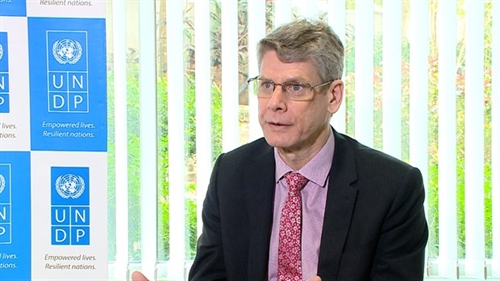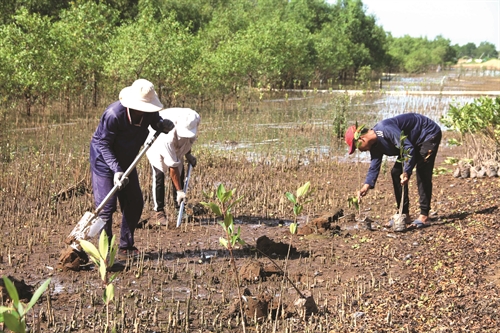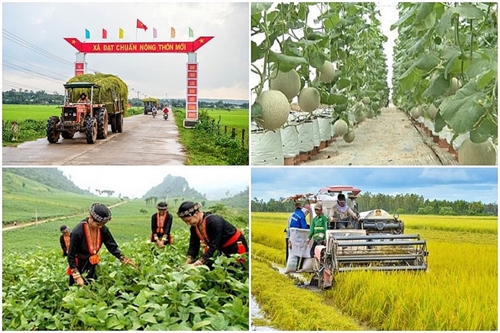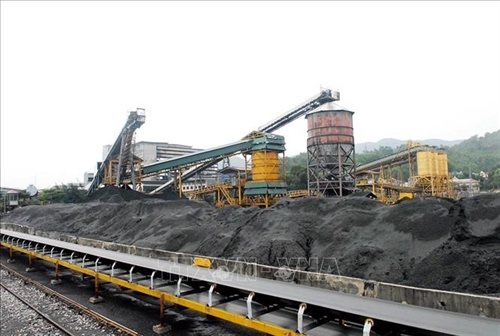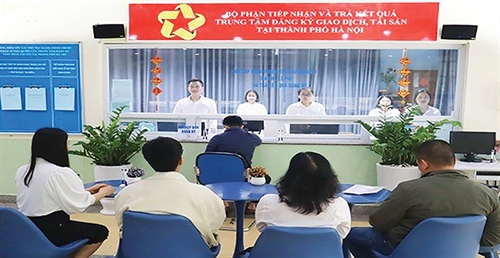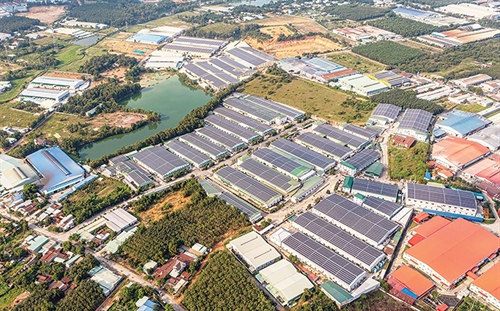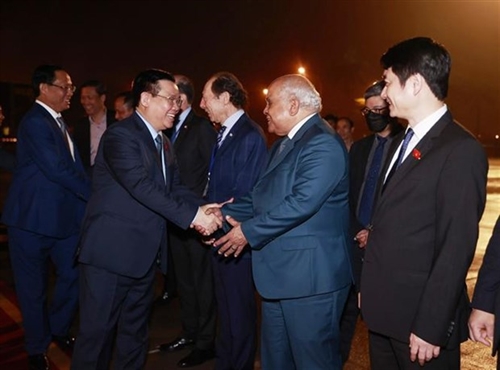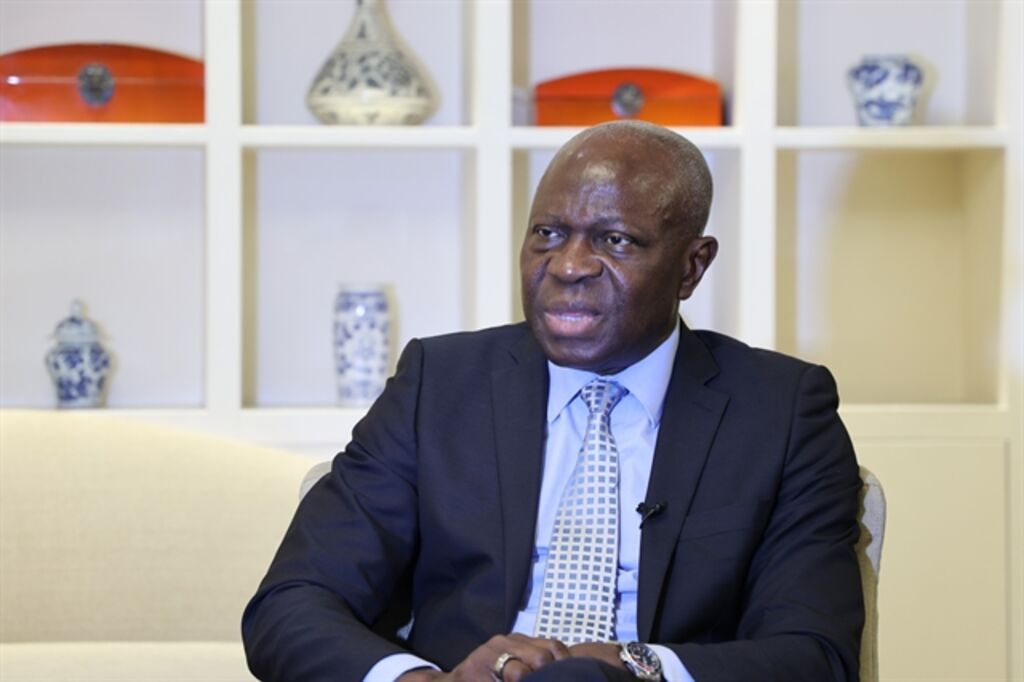 |
| Gilbert F. Houngbo, Director-General of the International Labor Organization (ILO).__Photo: VNA |
Following the COVID-19 pandemic and the global economic crisis, what predictions does the ILO have regarding the recovery of the global labor market?
For the labor market, we know that our estimates are turning quite clear. In 2023, the recovery will be rather timid, quite frankly, but it is true and we can look at that in the so-called global north - in most cases, most countries have seen a retreat in the labor market in a negative way just before COVID in the last quarter of 2019. But emerging economies and low-income economies are still struggling to recover fully from the economic devastation of COVID-19.
What we are also depicting in the labor market is the increase in the informal economy, the catching up of the economy in a post-COVID dimension, unfortunately, is happening more and more through the informal sector, which is not necessarily a good thing. This is why we are really pushing, advocating for more social protection programs and creating a conducive environment for the formalization of the informal economy.
In Vietnam in particular, has the labor market here improved following the pandemic?
It's improving, and we expect that not only Vietnam but ASEAN countries, the region is on the right track for that. I think globally, the country expects growth of around 5-6 per cent, which is slightly lower than what I've seen pre-COVID, but I think it's still quite an important growth. And we also know from meetings we have had with the Ministry of Labor, Invalid and Social Affairs, with the chairperson of the legislative committee, and his excellency the Prime Minister - all of them are assisting and making improvements for the Government to keep up with the social dimensions, to make sure that the social preoccupation of the society adapts too.
We continue the ongoing cooperation between ILO and the Government, there is an update on our MOU (memorandum of understanding), we just have to keep and continue on that, particularly in the area that focuses on how best to improve the supply chain on all its dimension as a huge contributor to economic growth, and by the same token, making sure that the labor rights and the workers' rights are also taken into account, which the Government is very much conscious of.
What are the changes and improvements in the workforce in Vietnam from after the wars until now?
Clearly, the resilience that the Vietnamese people have developed as a result of the devastating wars that they had to go through without being the aggressor, is a huge dream to come out of it. And today, being a middle-income country with the ambition of becoming a high-income country by 2045, the country is keeping its socialist approach to build on, while having a very rigorous and very dynamic market-oriented economy. The Prime Minister is clearly insisting on making sure that the wealth that is created by the dividends of all those efforts is equally shared amongst the different constituents of the society.
What are some of the major achievements in cooperation between ILO and Vietnam?
We started this program called Better Work in 2009, and today is really a reference point in helping the government sector factories to not only implement labor rights or welfare programs for the well-being of their staff, by the same token, increasing the orders from the international buyers, and so forth, so it's some kind of a win-win approach.
How do you evaluate Vietnam’s efforts in improving its institutions and laws to ensure the best rights and interests of employees?
I think those efforts are ongoing progress, there is progress that is really unquestionable from the labor code. The ILO was quite active in working with the authorities since 1994 on that.
It's very clear that the Government is very focused on not only creating economic growth but understanding how that growth can help secure the social dimension and making sure that nobody is left behind and dealing with any challenge that the society is also facing such as inflation and the cost of living or the inequalities.
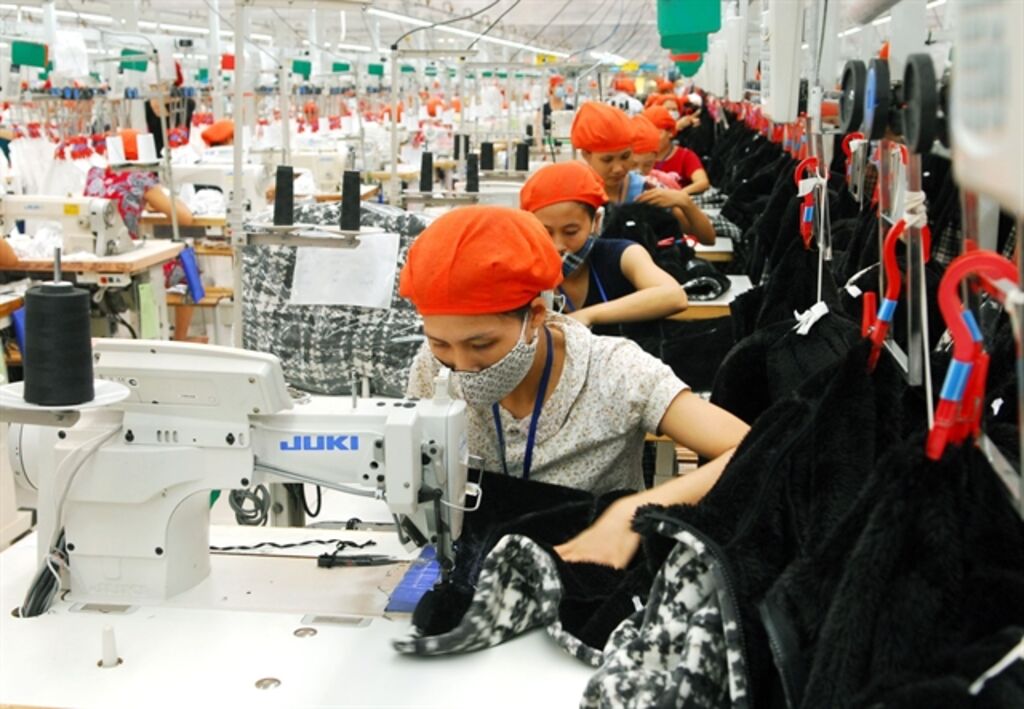 |
| ILO's program Better Work started in Vietnam in 2009, aiming to implement labor rights and welfare programs for the well-being of workers.__Photo: VNA |
Vietnam recently joined many bilateral trade agreements. How do these improve its labor market and facilitate more opportunities?
More and more of those trade agreements continue to include respect for labor rights, the fundamental labor rights, so this is where the economic dimension and the social dimension meet on that.
The more we improve the labor market condition, the more we improve the respect of the ILO conventions, the better the country will position itself, in terms of the international supply chain, or generally speaking, in trade negotiations. Most of the trade agreements are more and more including these propositions to make sure that countries of both parties of the agreements do abide by a minimum set of labor-related conventions.
The ILO has proposed Vietnam to become a pathfinder country for the United Nations' initiative on the Global Accelerator on Jobs and Social Protection for Just Transitions. What benefits will Vietnam have when becoming a pathfinder country?
Vietnam has always been at the forefront of initiatives back in the early 2000s, when we have the millennium development goals (MDGs), Vietnam already was one of the five countries in the world that were piloting different initiatives related to the MDGs and is centrally part of the just energy transition program. Being one of the pathfinder countries will also pave the way. I was in discussion with the government of the Philippines a few days earlier about that also - considering that it's an opportunity to really maximize or optimize - the issue around the fiscal space and social spending that will form the social protection, and by the same token, paving the way for just transition as we were discussing.
A pathfinder country is a matter of looking at the coherence of the policies in a given country so as to maximize the opportunities for job creation, social protection and driving the economy through the conditions. And in doing that, they seem to open a look at how the fiscal space can be constructed in a way that is not either - or, but in a way that can help finance both.
Why is it important to increase compliance with international labor standards for ILO member countries, including Vietnam?
ILO has close to 200 conventions that have been elaborated since more than 100 years ago. We tend sometimes to forget even the number of weekly working hours or the division as described by the ILO Convention, or even to have a weekend, which was also based on an ILO convention on forced labor. Now, we're going to work between now and 2025-2026 for potentially new conventions on the platform economy.
The world needs to pay more attention to the social front, where we need to have a better balance between the drive for economic growth, which is necessary, we've got to create wealth. By the same token, we must ensure that we don't do it at the expense of the social dimension, we don't do it at the expense of Mother Nature. ILO's contribution is through the establishment of labor rights in a way that will be conducive to increasing productivity, and also increasing the profitability of the enterprises, and therefore making the enterprises much more sustainable.
A lot of investors were coming to Vietnam because of cheap labor costs, but the local workforce is aimed to be more high-skilled. Will Vietnam remain an attractive destination for investment?
I think every country, including Vietnam, needs to adjust its strategy as we move along, based on the new factors on that. It might continue on the same model. Most of the countries in Southeast Asia really see a positive trend through the software supply chain and the offshoring that was coming from Europe, North America and Korea and also from Australia.
That is shifting a little bit including as a consequence of COVID and the new theories of friendshoring or nearshoring. On the flip side, by developing a much more high-end expertise that will create a competitive advantage for Vietnam. I do believe that there's a need to adjust one's strategy, it's normal for a country.-(VNS/VLLF)


